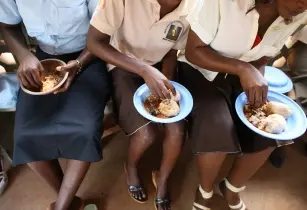The impact of the war in Ukraine is worsening the devastating food crisis for millions of people in the Horn of Africa, Islamic Relief, a humanitarian agency, has warned
Around 14 million people in Somalia, Ethiopia and Kenya are already in urgent need of aid due to the region’s worst drought in almost 40 years. The failure of three successive rainy seasons has destroyed livelihoods and forced families to leave their homes in search of food and water.
Now, staple foods such as wheat are becoming increasingly scarce and expensive as trade routes from Ukraine and Russia are severely disrupted. Many countries in the region usually import 60-80% of their wheat from Ukraine. With these imports disrupted, the price of bread and other staple foods is rapidly rising, affecting the poorest families most of all.
Aid agencies’ limited funds are being stretched further as prices rise. In Somalia, Islamic Relief has had to reduce the number of people receiving vital food deliveries at the start of Ramadan, because there is not enough funding to match the rising prices. One thousand families will not be able to receive food aid as a result.
Aliow Mohamed, Islamic Relief’s country director in Somalia, has recently visited camps in Baidoa, where people have fled the drought to try and find aid. Islamic Relief teams in the camps are providing food and shelter. He said, “We’ve had to reduce our food distributions by 1,000 families because of the drastic increase in food prices since the start of the Ukraine war. Prices have risen by 30 percent, and the cost of a 25kg bag of rice has gone up from US$15 to US$22.
“Life inside the camps is tough, and some people do not eat for a day or two. People share the food they receive from aid organisations such as Islamic Relief because there isn’t enough aid for everyone. Last week a family told me that they did not eat for two days because their neighbours who used to give them food are no longer receiving aid. The situation is bleak.
“Islamic Relief provides families with cash assistance so they can buy food in the local markets. Earlier, US$70 a month used to cover the basic food needs for a family of six people – now, because of rising prices, families need at least US$100 a month.”
Islamic Relief is calling on international governments to act quickly and support efforts to address the growing hunger crisis in the region.
In Ethiopia, the drought and internal conflict has left huge numbers of people in need of food aid. Millions of people from the east of the country have had to migrate to the capital Addis Ababa to try and escape the drought, straining the city’s limited resources. Now the impact of the Ukraine crisis is pushing even more people into destitution.
Ahmad Aba Jobir, Islamic Relief’s country director in Ethiopia, said, “The inflation rate in Ethiopia stands at 35% and food prices have skyrocketed in the last few weeks. People are struggling to make ends meet, especially with unemployment hitting new record levels. There is a massive shortage of food commodities such as bread and oil, and prices have soared. As a result, many bakeries have had to shut down. Fuel prices have increased by at least 30% over the last few weeks, and there is an acute shortage – in some places the queue of cars waiting outside fuel stations stretches for miles.
The crisis is impacting the most impoverished and vulnerable families across Africa. In Sudan, 80% of wheat imports have been disrupted since the start of the Ukraine crisis and wheat reserves are running low. While a usual shipment from Ukraine contains 120,000 tonnes of wheat the most recent shipment contained just 20,000 tonnes.
Elsadig Elnour, Islamic Relief’s country director in Sudan, says the poorest families are struggling to survive and many have gone whole days without eating. “Prices have soared dramatically since the start of the Ukraine crisis. There are now massive shortages of many staple foods, especially bread. A piece of bread that used to cost 30 Sudanese pounds now costs 50.”





